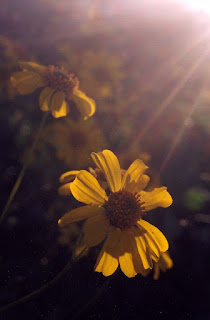I wondered why I kept writing in my journal every day. Was it just a “demented polygraphia”? Polygraphia is a mental disorder in which a person must continually write everything down. I admit I fit the description of this very well. But as for my journal, back in 2005, I answered, “It is an act of faith that somebody will want to reconstruct this framework of thought…” The world is like a comet, “which swings close to God’s sun then vanishes again into deep space. The fact that I bother to think and write at all is my fundamental…faith.
“I
benefit now from all the soul-building work of the past. If I look upon the
world and see only dirt, I am dead and unhappy. I must continue open to
inspiration. I turn in disgust from most organized religion…But I remember the
powerful inspiration I felt in a field of wildflowers 37 years ago [now 54
years ago]. I reaffirmed it this spring and will keep it alive, as if there is
a God, which there probably is.” I was referring to the Sonoran Desert spring
wildflowers.
But I also wrote, on 29 March, “It is clear to me that in this world, God is not in control. He has permitted a world of natural law, with cruel consequences, a world in which His love penetrates and contradicts, in which His love is of infinite value, and in which our purpose is to oppose all that is not love, all selfishness, even indifference. It is an artificial, contrived cosmos in which God makes us see how desirable love and beauty are, because of its stark contrast with crustal movements which grind all human life as if it were not there, with chromosomal breakages, and with forces of evolution, which have produce a species both intelligent and evil. To angels, goodness is ordinary. To us, goodness is sacrificial. And even if there is not life beyond, we have been permitted to taste and glimpse what is truly beautiful.”
The next day I wrote, “I stride into the future not knowing if God will even keep me alive, but ready in case he does (and, each second, each day, people live more often than they die).” I wrote this even as my illness returned. But even then, I wrote, because of my love for the creation, I was happier than Donald Trump. Yes, I wrote that in 2005, because even back then Trump was in the news as the perfect example of total furious selfishness.
At
the same time, I was reluctant to leave religion which was, I thought, a human
adaptation. “Religion is our warm hut of order, agnostic freedom is the cold
swirling storm.”


